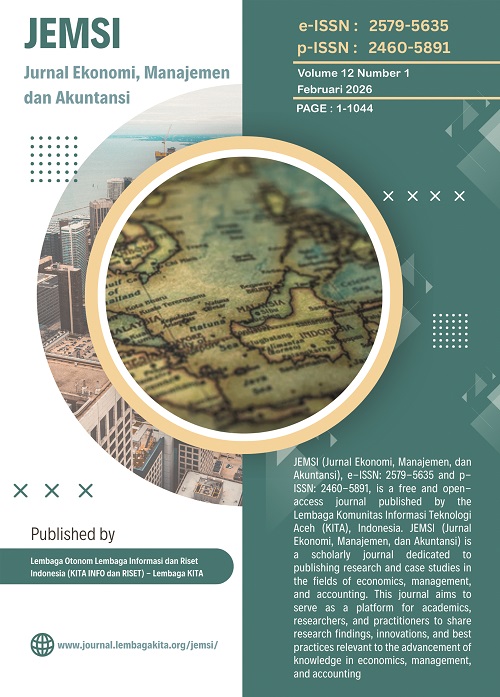Published: 2023-12-01
Analysis Of The Influence Of Work Engagement And Psychological Capital On Organizational Citizenship Behavior Of Employees In Government-Owned Marine Logistics Company
DOI: 10.35870/jemsi.v9i6.1663
Suriadi, Eva Yuniarti Utami, H. M. Anwar, Yusuf Ronny Edward, Musran Munizu
Article Metrics
- Views 187
- Downloads 584
- Scopus Citations
- Google Scholar
- Crossref Citations
- Semantic Scholar
- DataCite Metrics
-
If the link doesn't work, copy the DOI or article title for manual search (API Maintenance).
Abstract
The purpose of this study is to determine whether psychological capital and work engagement have a substantial impact on organizational citizenship behavior. Employees from the marketing, human resources, and claims divisions made up the population in this study. 300 employees were employed as respondents for this study. In this investigation, sampling was done using accidental and non-probability approaches. The researcher performed confirmatory factor analysis (CFA) to evaluate the measuring device's construct validity. Multiple regression analysis methods were employed in this study. The automated SPSS program was utilized to compute regression in this investigation. According to the findings of the study, psychological capital (self-efficacy, optimism, hope, and resilience) and work engagement (vigor, devotion, and absorption) have a considerable impact on employees' organizational citizenship behavior. Five independent variables were shown to have a substantial impact on organizational citizenship behavior according to the findings of the minor hypothesis test, which examined the regression coefficient of the independent variable on the dependent variable. Self-efficacy, optimism, resilience, vigor, and absorption are the five independent variables. Hope and dedication are two more independent variables that do not significantly affect outcomes. All independent variables together have an overall influence of 45% on organizational citizenship behavior. Additionally, self-efficacy, optimism, hope, resilience, vigor, and absorption are the six independent factors that significantly influence the proportion of variation to organizational citizenship behavior.
Keywords
No keywords available.
Article Metadata
Peer Review Process
This article has undergone a double-blind peer review process to ensure quality and impartiality.
Indexing Information
Discover where this journal is indexed at our indexing page to understand its reach and credibility.
Open Science Badges
This journal supports transparency in research and encourages authors to meet criteria for Open Science Badges by sharing data, materials, or preregistered studies.
How to Cite
Article Information
This article has been peer-reviewed and published in the JEMSI (Jurnal Ekonomi, Manajemen, dan Akuntansi). The content is available under the terms of the Creative Commons Attribution 4.0 International License.
-
Issue: Vol. 12 No. 1 (2026)
-
Section: Articles
-
Published: %750 %e, %2023
-
License: CC BY 4.0
-
Copyright: © 2023 Authors
-
DOI: 10.35870/jemsi.v9i6.1663
AI Research Hub
This article is indexed and available through various AI-powered research tools and citation platforms. Our AI Research Hub ensures that scholarly work is discoverable, accessible, and easily integrated into the global research ecosystem. By leveraging artificial intelligence for indexing, recommendation, and citation analysis, we enhance the visibility and impact of published research.




No author biographies available.
-
-
-
-
-
-
-
-
-
Hidayat, W. G. P., & Tannady, H. (2023). Analysis of Organizational Citizenship Behavior (OCB) Variables, Work Stress, Work Communication, Work Climate Affecting Employee Performance and Turnover Intention at PT. Bank Tabungan Negara (Persero) Tbk. Cabang Gresik. International Journal of Science, Technology & Management, 4(3), 688-696.
-
-
-
Authors who publish with this journal agree to the following terms:
1. Copyright Retention and Open Access License
Authors retain copyright of their work and grant the journal non-exclusive right of first publication under the Creative Commons Attribution 4.0 International License (CC BY 4.0).
This license allows unrestricted use, distribution, and reproduction in any medium, provided the original work is properly cited.
2. Rights Granted Under CC BY 4.0
Under this license, readers are free to:
- Share — copy and redistribute the material in any medium or format
- Adapt — remix, transform, and build upon the material for any purpose, including commercial use
- No additional restrictions — the licensor cannot revoke these freedoms as long as license terms are followed
3. Attribution Requirements
All uses must include:
- Proper citation of the original work
- Link to the Creative Commons license
- Indication if changes were made to the original work
- No suggestion that the licensor endorses the user or their use
4. Additional Distribution Rights
Authors may:
- Deposit the published version in institutional repositories
- Share through academic social networks
- Include in books, monographs, or other publications
- Post on personal or institutional websites
Requirement: All additional distributions must maintain the CC BY 4.0 license and proper attribution.
5. Self-Archiving and Pre-Print Sharing
Authors are encouraged to:
- Share pre-prints and post-prints online
- Deposit in subject-specific repositories (e.g., arXiv, bioRxiv)
- Engage in scholarly communication throughout the publication process
6. Open Access Commitment
This journal provides immediate open access to all content, supporting the global exchange of knowledge without financial, legal, or technical barriers.
